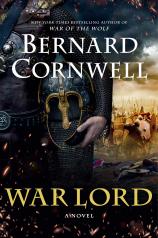War Lord
Review
War Lord
In the afterword, Bernard Cornwell apologizes to his wife for “fourteen years of slaughter,” and that’s about right. WAR LORD is the conclusion of his Saxon Chronicles, which is his second(!) long-term series about men and battles and war. The first, the famous Richard Sharpe series, followed a right bastard of a lieutenant in Wellington’s army from India all the way through Waterloo and beyond. The Saxon books are a little more restrained in scope geographically, but the two series are filled with blood and sweat, cowardice and valor, conflict and betrayal. They’re marvelous reads, and now both are completed.
Early on, Cornwell revealed to the reader that the indomitable Uhtred, the protagonist of the Saxon series, lived to enjoy a quiet retirement. This had the effect (if you don’t mind a little novelist inside-baseball) of lowering the stakes of each individual battle and removing a bit of tension from the narrative; you know that your first-person narrator is going to be able to get out of any sort of scrape in which he finds himself. (These books tend to get compared to George R. R. Martin’s sprawling saga, which glories in its multiple perspectives, which in turn famously allows for the sudden impactful death of point-of-view characters.) Cornwell has always made up for this by putting Uhtred at the heart of well-designed, carefully plotted and bloodily executed battle scenes. Even though we know he survives, each battle, as Wellington noted about Waterloo, was a nearest-run thing.
"I would like to thank the good people at Bookreporter for allowing me to write about many of the books in the Saxon Chronicles over the past 14 years. It has been a rare privilege."
WAR LORD ends with an Uhtred who is old and wise in the ways of battle, but still more than capable of slitting your guts with his seax if you are foolhardy enough to face him in the shield wall. Cornwell continues with the conflicts that dominate the earlier books: the struggle between Christian and pagan worldviews, the transition from small feudal kingdoms to a unified England, and the tension between Uhtred’s desire for independence in his own steading and the oaths he has sworn to Saxon rulers. But the heart of the books is armed conflict, and no one does armed conflict better than Cornwell.
This final installment doesn’t break any new ground and isn’t any kind of departure from the previous entries. Outside of the epilogue, there isn’t anything valedictory about the book. Uhtred begins as he ends, as a proud and stubborn pagan, an innovative and clever strategist, and a fearsome and valiant foe in battle. Cornwell isn’t interested in presenting Uhtred in anything like a modern context (as Hilary Mantel does with Thomas Cromwell in her peerless trilogy); he is relentlessly and thoroughly medieval in his worldview. And with one large exception, Cornwell doesn’t spend a lot of time tying up the loose ends of the series. (However, in all fairness, this is because Uhtred has killed a lot of the people who would have been loose ends in other series.)
Taking the series as a whole, it is an unalloyed triumph --- but only on its own terms. Cornwell prioritizes historical accuracy (up to a point, and to the degree that we know the details of 10th-century battles) and readability over literary style. If you’re judging the Saxon Chronicles in terms of literary craft, you’re using quite the wrong measuring stick. WAR LORD and its predecessors are as subtle as a boot to the face in the shield wall, largely by design. These novels occasionally get compared to the Aubrey-Maturin books, which is not wholly inapt, but Cornwell is playing a different game by different rules.
One striking feature of Cornwell’s books is that they are principally a vehicle for enthusiasm. And this is sort of an odd thing to say. I am a (self-published) novelist myself, and to be honest with you, I would not say that writing is something that I do enthusiastically, for pleasure. Cornwell has said that “if you are not enthusiastic about your book then it will show. Writing is not supposed to be a labour, but a joy.” It’s an attitude that I wish I shared.
However, I am very pleased to say that I take a great deal of joy in reading --- and rereading --- Bernard Cornwell’s work. I would like to thank the good people at Bookreporter for allowing me to write about many of the books in the Saxon Chronicles over the past 14 years. It has been a rare privilege.
Reviewed by Curtis Edmonds on November 25, 2020
War Lord
- Publication Date: November 23, 2021
- Genres: Fiction, Historical Fiction
- Paperback: 352 pages
- Publisher: Harper Paperbacks
- ISBN-10: 0062563246
- ISBN-13: 9780062563248




